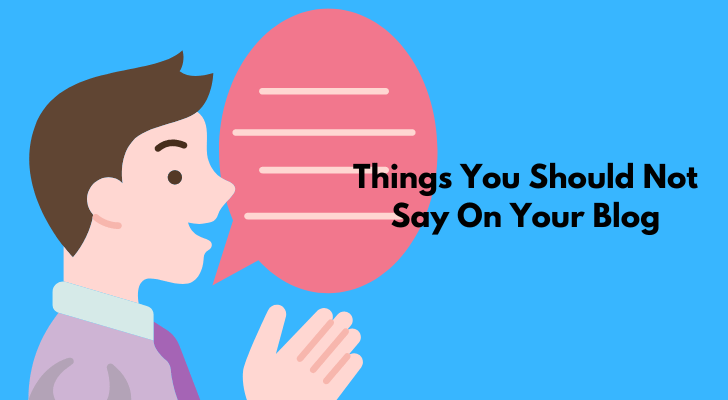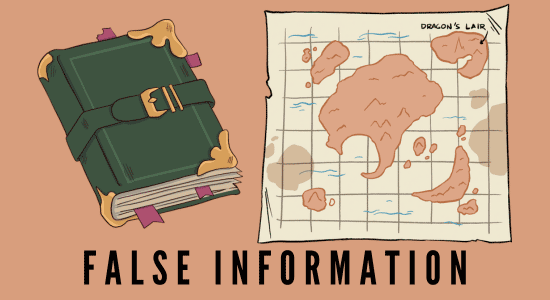Your blog should be a place where readers can find inspiration and encouragement, so be positive and focus on uplifting content.......
.......Who says that? Everyone! And that's absolutely rubbish. You can be as negative as you want.
The internet is full of lukewarm positive advice. Millions of websites (including ours) spit out useless how-to guides and now look at what's happened to ChatGPT. It barely suggests anything unconventional. It's important to try your best, be nice to other individuals because it's important. It's crucial to be patient, and it's important to ensure that every individual embraces happiness...
But there are certain things that you shouldn't really say on your blog, because once it's out there in cyberspace, it's hard to take back. Let's find it all out.

1. Defamatory Statements
Avoid making false statements that could harm someone's reputation or incite hatred towards individuals or groups. Be careful with what you write on your blog so that you don't say things that could hurt someone's reputation or make people dislike or hate them.
This means you should avoid making up stories or spreading false information about someone, especially if it could damage their image or make others think badly of them.
For example, let's say you have a blog about restaurants, and you write a negative review about a particular restaurant, claiming that the owner is involved in illegal activities without any evidence to support your claim. This false statement could harm the owner's reputation and cause people to avoid visiting the restaurant, even though it might not be true. This would be considered defamatory and harmful.
Another example could be writing a blog post where you unfairly criticize a certain group of people based on their race or religion. This could incite hatred and perpetuate harmful stereotypes. It's important to promote understanding and respect for all individuals and avoid making derogatory or discriminatory remarks.
By being mindful of the impact your words can have and focusing on fairness, respect, and truthfulness, you can create a positive and inclusive environment on your blog. Remember, it's always better to promote kindness and understanding rather than spreading false information or negativity.
2. Personal Attacks Using Offensive Language
Refrain from using offensive language or making personal attacks against individuals or communities. Be kind and respectful in what you write on your blog, so try to avoid using mean or hurtful words when talking about people or groups. Instead, focus on being friendly and understanding.
For example, let's say you have a blog about video games, and you write a post criticizing a specific game. It's okay to express your opinion and discuss the game's flaws, but it's not okay to attack the game developers personally by using offensive language or insulting them. This would be considered a personal attack, and it's best to avoid it.
Another example could be if you're writing about a controversial topic like politics. While it's okay to express your views and engage in respectful debates, it's not okay to use offensive language towards those who have different opinions than yours. Instead, focus on discussing the issues and presenting your thoughts in a friendly and respectful manner.
By choosing your words carefully and treating others with kindness, you can foster a positive and welcoming atmosphere on your blog. Remember, it's okay to disagree with people, but it's important to do so respectfully and without resorting to personal attacks or offensive language.
3. Confidential/Sensitive information
Do not disclose confidential or sensitive information that could compromise privacy or security, such as someone's personal details, financial information, or passwords. This means you should avoid talking about personal things like someone's private details, financial information, or passwords, as it could cause problems for them.
For example, let's say you have a blog about travel experiences, and you're excited to share a story about a memorable encounter you had during a trip. It's fine to talk about the experience in general, but you should avoid mentioning specific personal details about the people involved, like their full names, addresses, or any other sensitive information. Respecting their privacy is important.
Another example could be if you're writing a blog post about cybersecurity tips. While it's good to educate your readers about protecting their online accounts, you should avoid sharing specific passwords or any sensitive login details. Encourage your readers to create strong passwords and use secure methods without divulging specific information that could put their accounts at risk.
By being cautious and respectful about the information you share, you can help protect people's privacy and maintain a safe environment for your readers. Remember, it's important to be mindful of the potential impact your words can have on others' personal lives and security.
This hidden knowledge used by the elites will let you generate wealth and prosperity

4. Inflammatory and Discriminatory Remarks
Avoid making remarks that could be interpreted as discriminatory, sexist, racist, or offensive towards any particular group or individual.
Treat everyone with fairness and respect on your blog, so it's best to avoid saying things that could offend or discriminate against any specific group of people. This means steering clear of comments that unfairly target people based on their race, gender, or other characteristics.
For example, let's say you have a blog about fashion and you're discussing different body types and fashion choices. It's okay to talk about various styles and offer fashion tips, but it's not okay to make derogatory or hurtful remarks about someone's body size or shape. Instead, focus on promoting body positivity and celebrating diverse fashion choices.
Another example could be if you're writing about cultural practices or traditions. While it's okay to explore and appreciate different cultures, it's important to avoid making disrespectful or offensive comments about a particular culture or its customs. Instead, approach the topic with curiosity, respect, and a desire to learn and understand.
By promoting inclusivity, and acceptance, and avoiding language that could hurt or belittle others, you can create a welcoming and friendly environment on your blog. Remember, it's always better to spread kindness and understanding rather than engage in discriminatory or offensive remarks.
5. Misleading or False information

Ensure the accuracy of the information you provide and avoid spreading misinformation or unverified claims.
Share on your blog is accurate and reliable, and to avoid spreading false or misleading information that hasn't been properly verified. This means being careful about what you write and double-checking your facts before publishing.
For example, let's say you have a blog about healthy eating, and you're discussing the benefits of a particular diet. It's important to base your claims on scientific research or credible sources rather than making exaggerated or unsubstantiated claims about the diet's effectiveness. By providing accurate and verified information, you can help your readers make informed choices about their health.
Another example could be if you're writing about a current news event. It's crucial to ensure that you have reliable sources and to cross-check information before presenting it as facts. Spreading false or unverified claims can contribute to misinformation and confusion. Instead, focus on presenting well-researched and credible information to your readers.
By being diligent in your research and fact-checking, you can maintain the trust of your readers and provide them with reliable information. Remember, it's important to promote accuracy and truthfulness in your blog content, helping your audience make informed decisions.
6. Copyrighted Content Without Permission
Do not use copyrighted material, including images, videos, or written content, without obtaining proper permission or giving appropriate credit to the original source.
Respect the rights of content creators and avoid using their work without permission. This includes things like images, videos, or written content that are protected by copyright law. It's best to seek permission from the original creators or provide proper credit when using their work.
For example, let's say you have a blog about photography, and you want to include a stunning photo you found on the internet in one of your blog posts. Before using the photo, it's essential to make sure you have the permission of the photographer or the necessary license to use it. If you're unable to obtain permission, it's better to choose a different photo or use images from free stock photo websites that offer copyright-free content.
Another example could be if you want to quote or reference an article or book in your blog post. It's important to properly credit the original author and provide a citation or link to the source. This shows respect for their work and avoids any potential issues related to copyright infringement.
By seeking permission or using content that is freely available or properly licensed, you can ensure that you're respecting the rights of content creators. Remember, it's important to be mindful of copyright laws and to give credit where it's due, creating a fair and respectful blogging environment.
7. Excessive Self-Promotion

Refrain from excessive self-promotion or using your blog solely for advertising purposes. It's important to maintain a balance between promoting your content and providing value to your readers.
Strike a balance between promoting your own content and providing valuable information to your readers on your blog. Excessive self-promotion or using your blog solely for advertising can be seen as spammy and may turn off your audience. Instead, focus on creating content that adds value and engages your readers.
For example, let's say you have a blog about fitness and wellness. It's fine to share updates about your own fitness journey or products you genuinely believe in, but constantly bombarding your readers with ads or pushing your own agenda without providing helpful tips or insights could be overwhelming. Instead, aim to create a mix of informative and useful content that resonates with your readers and addresses their needs.
Another example could be if you're a travel blogger and you want to collaborate with travel companies or hotels. While it's natural to promote partnerships or sponsored content, it's important to do so in a way that maintains the trust and interest of your readers. Be transparent about any sponsored posts and ensure that the content still provides valuable insights, tips, or stories related to travel.
By focusing on providing valuable content and building a genuine connection with your readers, you can maintain their trust and interest. Remember, it's about finding a balance between self-promotion and creating content that benefits your audience, fostering a friendly and engaging atmosphere on your blog.
8. Illegal Activities
Do not promote or endorse illegal activities, including but not limited to drug use, violence, or hacking.
Always promote legal and ethical behavior on your blog and avoid encouraging or endorsing any activities that are illegal or harmful. This includes activities like drug use, violence, or hacking, among others. It's important to foster a positive and responsible environment for your readers.
For example, let's say you have a blog about personal development, and you want to discuss stress management techniques. It's perfectly fine to provide tips for healthy coping mechanisms like exercise, meditation, or seeking support from friends or professionals. However, it would be inappropriate and against the law to suggest illegal substances or activities as a means to manage stress.
Another example could be if you have a technology blog, and you want to write about cybersecurity. It's important to focus on raising awareness about protecting digital information and maintaining ethical behavior online. Encouraging hacking or any form of illegal activity would be detrimental and can lead to serious consequences.
By promoting lawful and responsible actions on your blog, you can create a safe and positive space for your readers. Remember, it's important to be mindful of the impact your words can have and to encourage behavior that respects the law and the well-being of others.
9. Personal Medical or Legal Advice
Unless you are a qualified professional, avoid giving personal medical, legal, or financial advice. Encourage your readers to seek advice from licensed experts instead.
Be cautious when providing advice on personal matters like medical, legal, or financial issues unless you have the necessary qualifications and expertise. Instead, encourage your readers to consult with licensed professionals who can provide accurate and personalized guidance.
For example, let's say you have a blog about healthy living, and you want to write about natural remedies for common ailments. While it's fine to share general information about natural approaches, it's crucial to emphasize that you're not a healthcare professional. Encourage your readers to consult with qualified doctors or healthcare providers for personalized medical advice based on their specific situations.
Another example could be if you're writing about financial planning on your blog. While you can share general tips and strategies, it's important to remind your readers that everyone's financial situation is unique. Encourage them to seek guidance from certified financial advisors or experts who can offer tailored advice based on their individual circumstances.
By reminding your readers to consult professionals in their respective fields, you ensure that they receive accurate and reliable advice. It's essential to prioritize their well-being and guide them toward expert help when dealing with personal medical, legal, or financial matters.
10. Highly Controversial Topics

Be mindful when discussing highly controversial topics such as religion or politics, as they can easily ignite heated debates and may alienate your audience.
When it comes to discussing highly controversial or sensitive topics like religion or politics on your blog, it's important to approach them with caution and considerate language. These topics can easily spark intense debates and potentially isolate or upset your audience. It's crucial to maintain a friendly and inclusive environment for all readers.
For example, let's say you have a blog about personal growth and you want to discuss different belief systems. While it's okay to explore different perspectives and foster understanding, it's important to present the information in a respectful and non-judgmental way. Instead of pushing your own beliefs or criticizing others, focus on promoting open-mindedness and respectful dialogue.
Another example could be if you're writing about social issues like human rights. While it's important to address these topics and raise awareness, it's crucial to do so sensitively and compassionately. Be mindful of different perspectives and avoid inflammatory language that may alienate certain groups. Encourage empathy and understanding, promoting constructive conversations.
By approaching controversial topics with empathy, respect, and open-mindedness, you can create a welcoming space for diverse opinions and foster healthy discussions. Remember, it's essential to consider the potential impact of your words and strive to maintain a positive and inclusive atmosphere on your blog.

